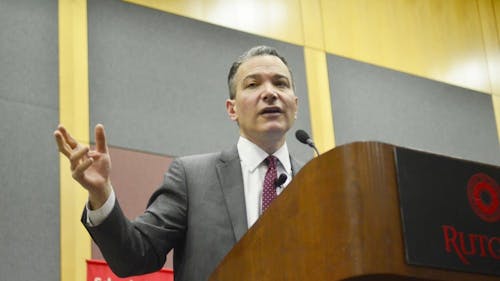Rutgers hosts talk on privacy, free speech

As technology has evolved, the issues surrounding privacy and free speech have evolved with them, said Jeffrey Rosen, president and chief executive officer of the National Constitution Center.
He spoke about privacy, free speech and corporate-bigness in the technological age at the second Richard D. Heffner Open Mind Lecture held on Jan. 28 in the College Avenue Student Center on the College Avenue campus.
The lecture was based largely on the beliefs and life of Louis Brandeis, a former associate justice on the Supreme Court of the United States.
It was held in honor of Richard Heffner, a distinguished professor at Rutgers and the 57-year host of “The Open Mind,” a public-access interview program.
Brandeis was the 20th century’s greatest critic of corporate and governmental bigness, Rosen said. Brandeis also held a deep devotion to the protection of free speech and the full civic participation of the citizenry.
“The talk tries to channel the greatest thinker about privacy in the 20th century, Louis Brandeis,” Rosen said. “Brandeis insisted that the values of the framing era had to be translated into an age of new technology.”
Issues of privacy in Brandeis’s day dealt with the constitutionality of wiretaps, Rosen said.
The Supreme Court ruled wiretaps were constitutional due to the lack of any physical trespass during Olmstead v. the United States. Brandeis was 1 of 3 justices who dissented, Rosen said.
“Brandeis always insisted on translating technologies and protecting the same amount of privacy in the age of the wires as the framers took for granted,” he said.
In the modern world, ubiquitous surveillance is a realistic possibility. The Supreme Court has yet to issue a clear decision on whether or not new surveillance techniques utilizing drones and other new-age technologies require warrants, he said.
“(The courts have) tended to say that you need a physical trespass before you can require a warrant for ubiquitous surveillance,” Rosen said. “You can collect so much information about someone if you track all of our movements in public that they make the general warrants that sparked the revolution look tame.”
Brandeis would have insisted on a warrant, he said. If one existed, he still might object.
Clandestine surveillance programs like the National Security Agency's PRISM program were also discussed.
These programs aggregate metadata, which is information that includes the locations and times of communications, according to The Guardian.
“Judge Leon, the district judge in Washington, D.C., said you can find out political associations, friends and intimate activities. You can basically reconstruct someone's thoughts,” Rosen said.
Brandeis would find this type of surveillance, and any surveillance that can invade “the privacy of the mind” appalling, Rosen said.
“The government says metadata is only the addresses of emails or telephone numbers,” he said. “It doesn't contain the content of the conversations, but it's increasingly obvious that by aggregating data, even metadata, you can learn so much about us that it does seem to me that they have the character of a general warrant.”
In the 1760s, British soldiers in the colonies were issued general warrants called writs of assistance, according to The Huffington Post. These warrants provided broad and unchecked power to conduct searches and seize goods.
Unlike general warrants, the clandestine surveillance programs were ineffective.
“I do note that the inspector general's report found that not a single terrorist attack was thwarted by PRISM, and therefore if you are focusing on the effectiveness of the surveillance, note that the government's own watchdogs have some questions about that,” Rosen said.
Both the Bush and Obama administrations have defended the efficacy of the programs. The surveillance seems to increase the effectiveness of law enforcement response to threats, he said.
Heffner died in 2013 from a cerebral hemorrhage, according to the The New York Times.
Heffner had an exceptional faith in the American democracy and the ability of the media to create constructive discourse, Rosen said.
“(He was) an idealist and a patriot, a founder of the Public Broadcasting Service (PBS) and early oversight bodies in television. I think when people look back on his career, they will realize he was one of the most towering figures in American media in the 21st century,” Rosen said.



